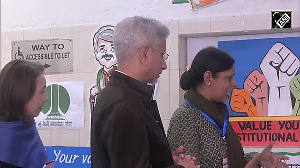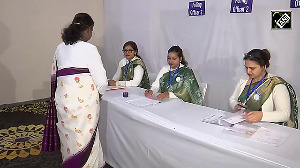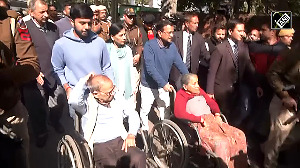Shashi Sinha executive director, FCB Ulka knows what to expect when he opens his e-mail these days. Every time he checks, there's a flood of outraged mails from the alumni of the three Indian Institutes of Management.
And it isn't only his email basket that is filling up faster than he can press the Enter button. The IIM-Ahmedabad alumnus has also been inundated by SMS messages and phones calls from other former IIM students.
IIMs: Triumphs & Tribulations
The IIM controversy:Complete Coverage
What are the messages about? Some are anguished diatribes against HRD Minister Murli Manohar Joshi and his move to chop fees at the IIMs by one-fifth. Others are stirring calls to take part in a giant signature campaign, which will include the brightest names in corporate India.
Sinha is one person who admits he has mixed feelings about the campaign. Why, after all, should the distinguished alumni of the three IIMs fight for higher fees?
And, is it a valid argument to say that this is a precursor to the Government interfering in the functioning of the IIMs? After all, the Government set up the IIMs and, until the mid-'90s provided the funds that kept them going.
But the ex-IIM fraternity don't see it that way. And, by any standards, they are a powerful community. Out in front is Infosys' chairman and chief mentor N R Narayana Murthy who met Joshi three weeks ago to put forward the IIM view. Then, there's Kiran Karnik, president Nasscom, who has also dashed off letters to the minister.
There are others too, who are watching from the sidelines. The fact is that the alumni of the three IIMs include an unmatchable galaxy -- a Who's Who of corporate India. To mention just a few names, there are corporate stars like ICICI chairman K V Kamath and Vindi Banga, the chairman of Hindustan Lever.
Why are they so outraged? "The issue is not just so much the reduction of fees but when and where does the government enter," says Ramesh Venkateswaran, head of consulting firm Almak Management Services and head of IIM Bangalore's Alumni Association.
Adds Jaitirth Rao, chairman & CEO of IT firm, MphasiS. "This is the Trojan horse for eliminating autonomy. It is reverse Robin Hood -- robbing the poor to subsidise the rich."
Clearly, the alumni believe that the Government is looking for ways to extend its reach into the IIMs. The general fear is that with the IIMs no longer in a self-sustaining mode, there will soon be a time when they will be forced to knock on government doors for increased grants and subsidies.
The alumni don't trust the Government. "They will actually get into the business of faculty appointments, changing curriculum and also who should and shouldn't be admitted. In other words, they will massacre the very sanctity of the IIMs, something which they have done with the other flourishing universities in the country," says an IIM Calcutta alumnus, and a senior manager with a leading textile firm.
For the IIMs, student fees range from 10 per cent to 25 per cent of their total revenues. The other streams include the faculty's consulting assignments. And the government grant, which varies anywhere from Rs 20 crore (Rs 200 million) to Rs 70 crore (Rs 700 million).
Currently, the IIM fees are pegged between Rs 100,000 to Rs 150,000 per annum for a two-year course. Till the early '90s, the IIMs were heavily subsidised by the government.
With liberalisation, they were encouraged to be more self-reliant. And as part of the new policy then, they were also given the go ahead to increase fees and generate alternate revenue streams. Now the Government is backtracking on that.
What is the Government's position on the entire controversy? The HRD ministry has been keeping a studiously low profile during the last few weeks.
The ministry argues that it is following the recommendations of the U R Rao Committee Report. The Rao committee was set up to mainly look at the All India Council for Technical Education Act and how institutes under it would survive in a global economy.
Its author U R Rao argues that the whole controversy has been seriously overblown. Says Rao: "If there was autonomy even during the subsidy days until a decade ago, why should it not be there now?" Rao argues that if the country wants more employable people, the IIMs have to be made accessible to all.
"I am not so much worried about the unemployed as the unemployable," he asserts. He also criticises the ex-students who've come out against the fee reduction. "There are a lot of misconceptions on the issue which need to be sorted out."
Like what? The IIMs and IITs do not fall under the purview of the AICTE -- which is what Rao was charged to investigate -- but he claims that they are only spearheading the controversy because they charge exorbitant fees.
But the alumni say the HRD minister has already shown he wants to interfere in the running of the institutes. "The HRD minister has been talking about 'relevant courses' and saying that the faculty should spend more time teaching. What does it mean? Nobody said that during the subsidy days," says an alumnus.
Again Rao defends the Government. Questioning the relevance of the courses, according to him, is only natural. "And why shouldn't the faculty teach more when the IIMs have an average faculty to student ratio of 1: 8 instead of the global norm of 1: 15," he adds.
Currently, according to the AICTE data, there are six IIMs and 930 other management institutes in the country. Together they churn out almost 65,000 students, of which only around 2,000 come out of the IIMs.
Similarly, there are 1,200 odd engineering colleges and seven IITs. Of the 360,000 engineers that pass, the IITs account for only 3 per cent. "If India is to be an advanced country by 2020, you have to have the right type of management, engineering and technical students. Where are all of them going to come from unless we slash fees and increase capacities," asks Rao.
The IIM alumni argue that the Government really needs to turn its attention to primary education. So it could do well to stay away from secondary education. Rao says the Government cannot neglect one or the other.
"Yes, the focus is primary education but if the country has to be globally competitive, we have to look at higher education too," he says.
Now, even industry bodies like the Federation of Indian Chamber of Commerce & Industry have jumped into the fray. Y K Modi, Ficci chairman says that the organisation has just released a report, which recommends raising fees in institutions like the IIM. "The market failure is in primary education," says Modi.
Maybe. But in all this, what is in it for the IIM alumni? "We are the direct beneficiaries of business schools and we believe there is no substitute for fee revenues. If that is tampered with, it will erode the IIMs' equity," says MphasiS' Rao.
Will the captains of Indian industry stand up for their old alma maters? Some are clearly reluctant to put their heads over the parapet. But Joshi has taken corporate India head on and the last word on the subject hasn't been heard yet.






 © 2025
© 2025